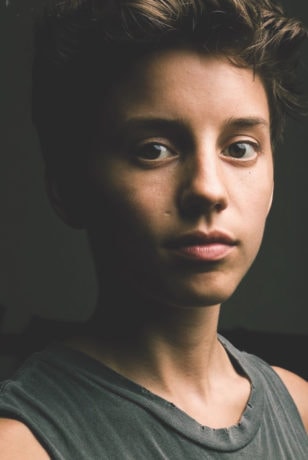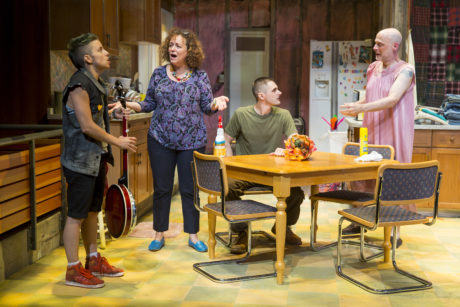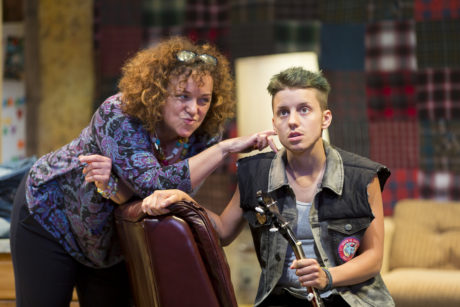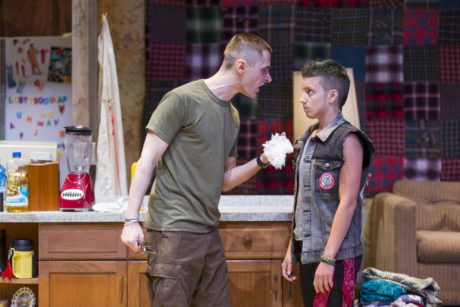The young performer, playwright, and self-described gender warrior Malic White is in town from Chicago making a singularly significant debut on a DC stage playing Max, a whip-smart radical queer resister to heteronormativity. The play—Taylor Mac’s Hir—is a seditious celebration of gender liberation. It is also, as I wrote in my column, one of the funniest and profoundest farces I’ve ever seen.
A major factor in the play’s profundity is White’s punky, impudent performance as Max. I sensed the actor and character had a lot in common. White seemed so real, raw, and revelatory in the role, I was curious to know where they were coming from.
John: Thank you for this interview, Malic! I loved the play Hir, I loved your performance in it, and I loved the role you play, Max. I’d like to begin by asking you to tell readers about that character. Who is Max? What is ze like? What is hir story?

Malic: Max is the 17-year-old child of Paige and Arnold and sibling to Isaac. Ze has recently come into hir trans identity. Max is sharp, passionate, idealistic, surly, horny, and ever-changing. Max is an observer and an uncertain leader, a glitter-encrusted mermaid (mer-person?) on the bow of the family ship.
Who is Max to hir mother Paige, hir father Arnold, hir brother Isaac? And who is Max to you?
To Paige, Max is a teacher. To Arnold, Max is a nuisance. To Isaac, Max is a puzzle. I see Max as a survivor.

How did Woolly find you for the role?
I sought out this play because I’m a fan of Taylor Mac’s work. I had previously performed at Woolly Mammoth with the Neo-Futurists, the Chicago-based theater company I’ve been part of since 2012, so when I learned that Woolly would include Hir in their season, I hunted down director Shana Cooper’s email address and asked to send her a video audition for Max.
When you first read the script, what were your thoughts about playing Max? Is the character like any roles you’ve played before? And did you have any concerns about how Max would read to audiences who may be unfamiliar with the fact that, as Max says, “there are more than two genders in the world”?
I usually play teenagers, so in that sense, Max is similar to other characters I’ve played, but this is my first opportunity to play a transgender character. Max’s perspective on gender is becoming part of our current cultural consciousness, so most audience members will have had some exposure to the gender spectrum. Max states hir ideas clearly and emphatically, but the real teachers in Hir are the cisgender characters. Cisgender audience members look to Paige, Isaac, and Arnold to model how they should feel about Max’s ideas.
I did (and still do) have concerns about how this particular production of Hir presents the cisgender characters’ perspective on gender. This production plays into opportunities for audience members to laugh at Max with hir “unusual” pronouns and “wacky” ideas, and when audiences are laughing at Max, they’re laughing at me. As a trans person, performing in a production that creates space for that kind of laughter is very, very hard. Fortunately, many of those same audience members who start off laughing jump on board with Max by the end of the play. I hope that audience members engage in further conversations about gender after the play.

Playwrights’ casting preferences were in theater news recently with the estate of Edward Albee’s much-talked-about insistence that the role of Nick in Who’s Afraid…? be played by a white actor (blond and blue-eyed, according to the script). Somewhat similarly (though not equivalently), Taylor Mac’s script is very specific about how Max should be cast: “It’s important to me that the actor playing Max be someone who was a biological female and now identifies as transgender or gender-queer.” Now that you have played the role, do you agree with Mac’s casting stipulation?
Theater dominated by white cis men is boring and irrelevant. I do not support a playwright’s right to determine the race, gender, ability, or body type of any actor chosen for their play when that right is used to exclude bodies that are underrepresented in theater. Male characters can and should be played by women and trans people. Traditionally white leads can and should be played by actors of color. Ingenues can and should be played by fat actors, trans actors, actors of color, and actors with disabilities. And when characters are written for these underrepresented bodies, we need to (literally) play a role in our own representation.
It is never appropriate to cast a cisgender actor as a transgender character.
We rarely get the chance to tell our own stories, and casting agents, directors, and celebrated playwrights are typically white, typically male, and almost always cisgender. This is why I usually write my own work.
I worked with an almost entirely cisgender team on Hir. I was glad that I was in the room to offer my perspective on the trans experience, and I’m grateful for Taylor Mac’s insistence on appropriate casting.

Max’s pronouns are ze (not she or he) and hir (not her, him or his). Would you talk about your own decision to adopt your pronouns they, their, and them?
They/them/theirs pronouns are what I need to I feel seen and respected.
I love your Hir-program bio, where you identify as a gender warrior. Would you talk about what being a gender warrior means to you? Why is it important personally and politically? How does it affect your artistic choices?
Being a gender warrior means being an anti-racist, anti-ableist, queer, feminist, prison-abolitionist, animal-liberationist human who is aware of how gender norms affect every system. It means infiltrating environments like well-respected theaters, where people like me are often not cast, not seen, or are made to feel unwelcome. Being a gender warrior and a theater professional means that I think very carefully before compromising my politics for a paycheck. I hope I never make boring theater. I make plays I want to see.
Max in the play is also a gender warrior in a sense. Would you talk about how similar or different Max’s convictions and politics are to yours?
Max and I have similar politics, and I admire Max for expressing those politics emphatically and unapologetically. Like Max, I’m committed to gender liberation. Like Max, reading anarchist theory gives me hope. Something Max has yet to learn and that I’m still learning is how to work within the systems I critique in order to dismantle them. Here’s something I can learn from Max—ze is a lot better at correcting hir pronouns than I am at correcting my own. I’ve got work to do.
You have so many talents. You are a punk performer, a clown, a playwright, an actor, a director, an author, a musician, and an ensemble member of the Neo-Futurist Theater. Would you talk about your work with Neo-Futurists and how it relates to your personal and artistic politics?
The Neo-Futurist Theater is my artistic home. That company gave me the opportunity of a lifetime when I was cast as an ensemble member at the age of 22. Performing in the Neo-Futurists’ late-night show (The Infinite Wrench) has forced me to consistently write new work and put it on stage most weekends for nearly five years, and I have grown immensely as an artist because of that. The Neo-Futurists have also given me the opportunity to tour, teach, and write and perform a full-length rock musical.
The Neo-Futurist aesthetic speaks to me both artistically and politically. We are ourselves on stage. We write and direct our own stories with props from the dollar store and minimal rehearsal time. Tickets are cheap. We don’t have big budget, costumes, or a fancy set, yet we’ve been selling out houses for nearly 30 years because the art is good. We are real, we are raw, and we are constantly taking steps to make our work more accessible. The Neo-Futurists believe that theater is for everyone—not just rich white people—and I hold fast to that belief regardless of the space I’m working in.
You had a column on the online magazine Bitch Media called End of Gender. Would you talk about what you have written there and how it relates to the themes in Hir?
Oh, wow! That was so long ago! When I graduated from college, I briefly worked as a columnist for the feminist pop culture website Bitch Media. I don’t even remember what I wrote. I hope it was brilliant.
You and Molly Brennan, your partner, co-host and co-curate a monthly variety series called The Kinky Butch Witching Hour. Would you talk about what that is and where folks can find it?
The Kinky Butch Witching Hour is a monthly variety night in Chicago that celebrates sex, deviance, and all bodies. Performances include everything from sideshow to burlesque to erotic poetry. We’re currently on hiatus because we’re searching for a new venue, but we’ve had so much fun creating a sex-positive space in the performance community!
You and Brennan also co-wrote a full-length rock musical, Pop Waits. Would talk about that? Will audiences in DC get to see it?
Pop Waits is a rock musical about becoming our own heroes to survive depression. In Pop Waits, Molly and I play ourselves, but we also get to take on the physicality and actions of our rock heroes, Tom Waits (Molly) and Iggy Pop (me). Pop Waits is filled with original songs, stage dives, and radical honesty, and I loved doing it. We don’t currently have plans to bring Pop Waits to DC, but we’ll see.
One of your online bios says your aim is “to smash the gender binary and build community in unexpected places.” How do you believe theater can do that? How do you see the role of theater artists in doing that? And how can audiences who want that to happen be part of it?
The single most important thing that theaters can do is put marginalized voices in leadership positions.
How do you see the role of theater artists in doing that? And how can audiences who want that to happen be part of it?
Theater artists can write our own work when existing theater does not speak to us. White actors can turn down auditions for characters of color. Cisgender actors can turn down auditions for transgender characters. We can all take steps toward making theater more accessible by securing grants to make our spaces ADA accessible and by offering multiple ASL-interpreted, captioned, and audio-described performances. Audience members can chose to support only theaters that put a variety of voices on their stages and in their leadership positions.
Why should audiences see Hir, and what do you hope audiences will take away from it?
Audiences should see Hir to laugh hard, think harder, and gain a nuanced insight into the cycles of abuse in American families. See Hir with an open mind and an open heart. Go with friends and talk about it later. Question your own reactions. Never fear your own radical ideas.
Hir plays through June 18, 2017, at Woolly Mammoth Theatre Company – 641 D Street NW, in Washington, DC. For tickets, call (202) 393-3939, or purchase them online.
LINKS:
Magic Time!: ‘Hir’ at Woolly Mammoth Theatre Company by John Stoltenberg





